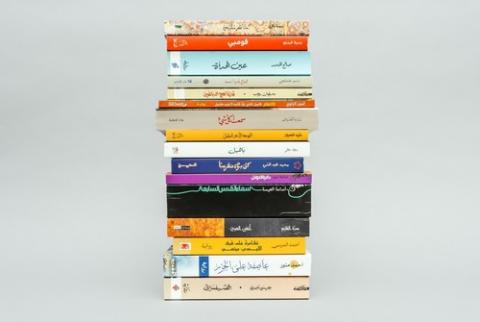International Prize for Arabic Fiction announces 2024 longlist and judges
14/12/2023

Today, 14 December 2023, the International Prize for Arabic Fiction (IPAF) – the most prestigious literary prize in the Arab world - has revealed the longlist of 16 novels in contention for the 2024 prize, which will award $50,000 to the ultimate winner next April.
The list has been chosen from a total of 133 books published in Arabic between July 2022 and June 2023 by a panel of five judges, chaired by Syrian writer Nabil Suleiman. Joining him are Palestinian writer, researcher and academic Sonia Nimr, Czech academic František Ondráš, Egyptian critic and journalist Mohamed Shoair, and Sudanese writer and journalist Hammour Ziada.
The selection includes four authors who have been previously recognised by IPAF: Raja Alem, joint winner of the Prize in 2011; Mohammed Abdel Nabi, longlisted in 2013 and shortlisted in 2016; Rashid al-Daif, longlisted in 2012; and Amin Zaoui, longlisted in 2013 and 2018, and also a former judge (2020). The full 2024 longlist, listed in alphabetical order by author surname, is as follows:
|
Author |
Title |
Country of origin |
Publisher |
|
Mohammed Abdel Nabi |
Nearly Every Day |
Egypt |
Markez al-Mahrusa |
|
Badriya Albadri |
Foumbi |
Oman |
Dar Al Saqi |
|
Raja Alem |
Bahbel: Makkah Multiverse 1945-2009 |
Saudi Arabia |
Dar Tanweer - Lebanon |
|
Sara Alsarraf |
I Heard Everything |
Iraq |
Dar al-Hikma |
|
Rima Bali |
Suleima's Ring |
Syria |
Tanmia Publishing |
|
Rashid al-Daif |
The Other Face of the Shadow |
Lebanon |
Dar Al Saqi |
|
Osama al-Eissa |
The Seventh Heaven of Jerusalem |
Palestine |
Al-Mutawassit |
|
Dorra al-Fazi' |
I Hide Passion |
Tunisia |
Sindbad |
|
Saleh al-Hamad |
Eye of the Kite |
Saudi Arabia |
Dar Rashm |
|
Basim Khandaqji |
A Mask, the Colour of the Sky |
Palestine |
Dar al-Adab |
|
Ahmed Menour |
Storm Over the Islands |
Algeria |
Dar al-Tanweer Algeria |
|
Ahmed al-Morsi |
Gambling on the Honour of Lady Mitsy |
Egypt |
Dar Dawen |
|
Eissa Nasiri |
The Mosaicist |
Morocco |
Masciliana |
|
Salha Obeid |
Spice Circle |
UAE |
Al-Mutawassit |
|
Sufyan Rajab |
Reader of the Tanners' Alley |
Tunisia |
Masciliana |
|
Amin Zaoui |
The Idols |
Algeria |
Editions Daliman Algeria |
The novels take readers from a racecourse in 1920s Cairo, to a rare book market in Tunisia; from the ancient houses of Baghdad, to a famine in 1970s Jerusalem. We also see customs and traditions of territories new to Arabic literature, such as the Comoros islands and the Belgian Congo. Transitional periods in history are deconstructed to answer questions about the current moment, and to explore the impact of socio-political conditions on both individual identity and interpersonal relationships. A number of the books reflect on the act of creation, while other recurrent themes include war, exile, and impossible love.
Nabil Suleiman, Chair of the 2024 judges, said:
The longlist for this year’s prize cycle comprises rich and varied narratives. A broad range of Arab countries are represented, resulting in the exploration of diverse experiences, settings, and characters. The list presents fictional characters who face complex societal issues, some old and others new, and topics such as the role of the arts, women’s rights, and cross-cultural interaction. Some novels explore individual, and others national, consciousness. They open up new perspectives by interrogating history to connect past and present struggles, particularly in places rocked by despotism, persecution, wars, uprisings, expulsions and exile. Each offers compelling and original narratives, and considered together, the list has a distinctly epic feel in scope and range.
Professor Yasir Suleiman, Chair of the Board of Trustees, said:
The longlist for this year’s prize cycle displays a larger than usual variety of voices from different parts of the Arabic speaking world, some of whom are newcomers to the world of the novel. Rooted in their local environments, some works provide unsettling narrations of the situations they encounter, to reveal the entrenched social and political ills pervading those environments. Returning to a mythic and ancient past, others use this history to provide counter-intuitive readings of the present. Some titles meanwhile use experimental modes of narration to weave parallel storylines to display fracture and complexity. At a profound affective level, a good proportion of the novels on this list will chime with the dark mood that is gripping the Arab world at this alienating moment in history.
